Let’s be real: your hunt for the perfect property kicks off on your phone, not in a car cruising for “For Sale” signs. But with a tidal wave of apps and sites all promising your dream home, it’s easy to drown in a sea of outdated listings and questionable ‘Zestimates’. Forget the noise. This isn’t just another boring list; it’s your battle plan for conquering the crowded market. We’re slicing through the digital clutter to crown the best real estate listing websites for every type of buyer, seller, renter, and investor out there.
We’ll dive deep into the platforms that actually deliver, from mainstream giants like Zillow to niche powerhouses like LoopNet for commercial investors. You’ll get the unfiltered scoop on what works, what doesn’t, and which platform is your perfect match, ensuring every click gets you closer to the keys. We’re serving up the unvarnished truth, complete with screenshots and direct links, so you can see for yourself.
Beyond home purchases, these digital platforms are invaluable tools for landlords looking to attract stellar tenants; learn more about effective strategies for advertising rental property. Whether you’re flipping a foreclosure in Los Angeles or hunting for your first apartment, this guide provides the clarity you need to make your next move with swagger.
1. Zillow
Zillow is the undisputed heavyweight champion of real estate portals, flexing the highest traffic and one of the largest databases of for-sale and rental properties in the U.S. Its massive reach makes it an essential first stop for almost any real estate journey, from casual scrolling to serious house hunting. The platform slays with an intuitive, map-based search and a mobile experience that’s second to none, making it one of the best real estate listing websites for on-the-go searches.
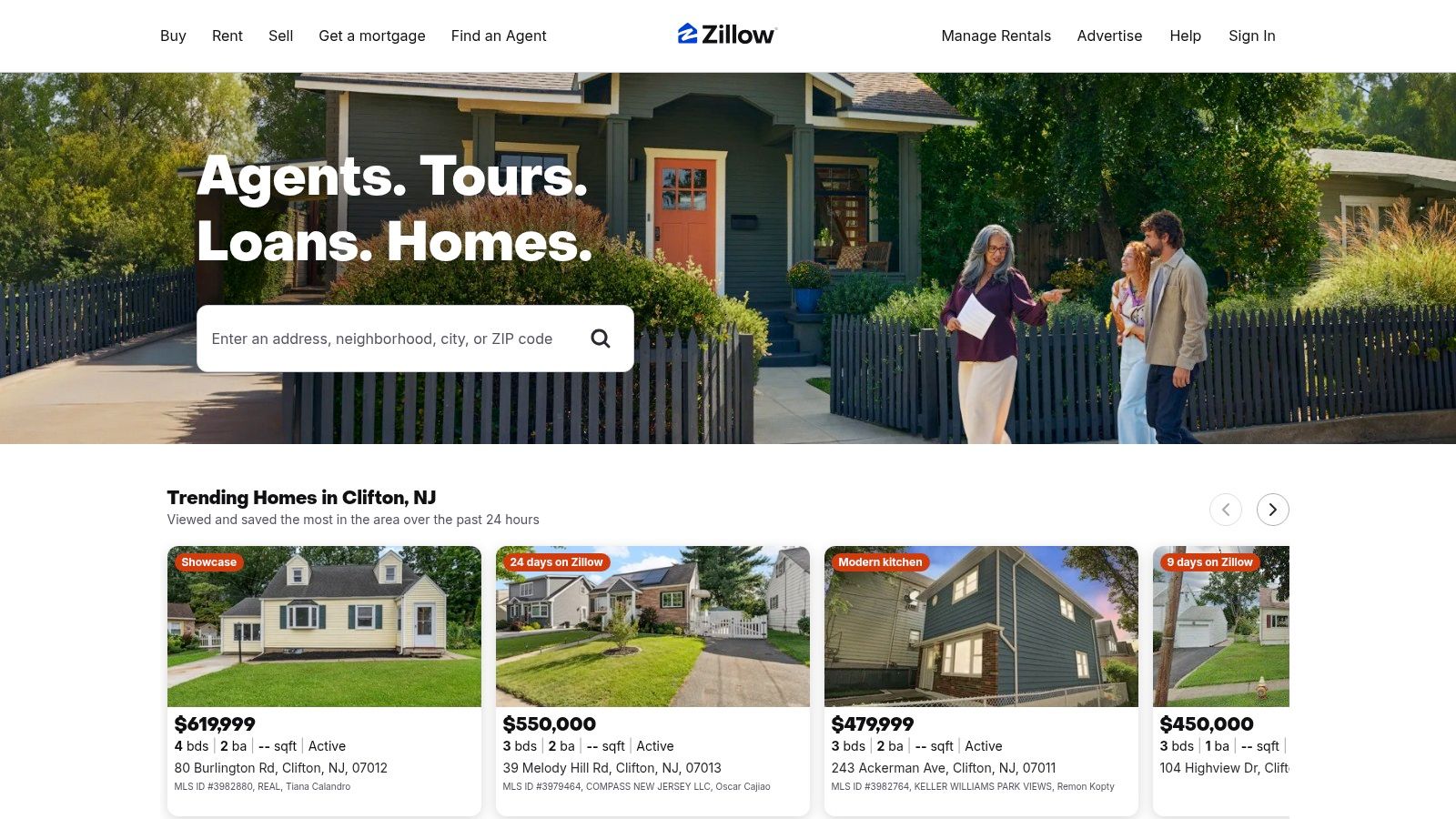
What truly sets Zillow apart are its slick features aimed at demystifying the home-buying chaos. Tools like BuyAbility give you a real-time estimate of monthly payments as you browse, while Tour Itineraries let you organize and share a list of properties with your agent directly through the app. For sellers, Showcase listings now feature immersive SkyTour 3D exterior views, offering a dynamic perspective that flat photos can’t touch. These features must always be used in compliance with Federal Fair Housing guidelines, focusing on the property’s attributes, not the potential occupants.
Pros & Cons
Pros:
- Unrivaled inventory and user traffic provide maximum exposure for sellers and endless options for buyers.
- Feature-rich mobile app with powerful and highly specific search filters.
- Extensive rental network, integrating listings from partners like Trulia and HotPads.
Cons:
- The “Zestimate” is a useful conversation starter but should never be mistaken for a professional appraisal.
- Listing data freshness can occasionally lag, depending on the speed of the local MLS feed.
Website: https://www.zillow.com
2. Realtor.com
Realtor.com flexes its muscle as the accuracy-first powerhouse, leveraging its official relationship with the National Association of Realtors to pull data directly from hundreds of local MLS feeds. This direct pipeline often means its listings are more up-to-date than competitors, making it a go-to for serious buyers who need timely and reliable information. Its clean, data-centric interface appeals to users who prioritize facts over flair, solidifying its reputation as one of the best real estate listing websites for accuracy.
The platform shines with its comprehensive, verified property data, including tax history, neighborhood noise levels, and even flood risk assessments. For those ready to move forward, Realtor.com makes it easy to find a good real estate agent directly from a listing. Free consumer accounts allow users to save searches, receive instant alerts for new properties, and track market changes, offering powerful tools for both first-time buyers and seasoned investors. All neighborhood data is presented objectively to empower consumer choice without steering, adhering to fair housing principles.
Pros & Cons
Pros:
- High data accuracy and timeliness due to direct MLS integration.
- Provides in-depth neighborhood information, including schools, noise levels, and commute times.
- Strong focus on connecting buyers with real estate professionals.
Cons:
- The user interface is more functional than flashy, lacking some of the slick design of newer apps.
- While its rental section is robust, it’s not as comprehensive as platforms dedicated solely to rentals.
Website: https://www.realtor.com
3. Redfin
Redfin crashes the party by blurring the line between a traditional brokerage and a tech-driven portal, offering a unique, integrated experience for buyers and sellers. It operates as a licensed brokerage with its own agents, and its website is known for having one of the fastest and most accurate MLS data feeds available. This speed makes it a top choice for serious buyers who want to pounce on new listings the moment they hit the market, cementing its place as one of the best real estate listing websites for time-sensitive searches.
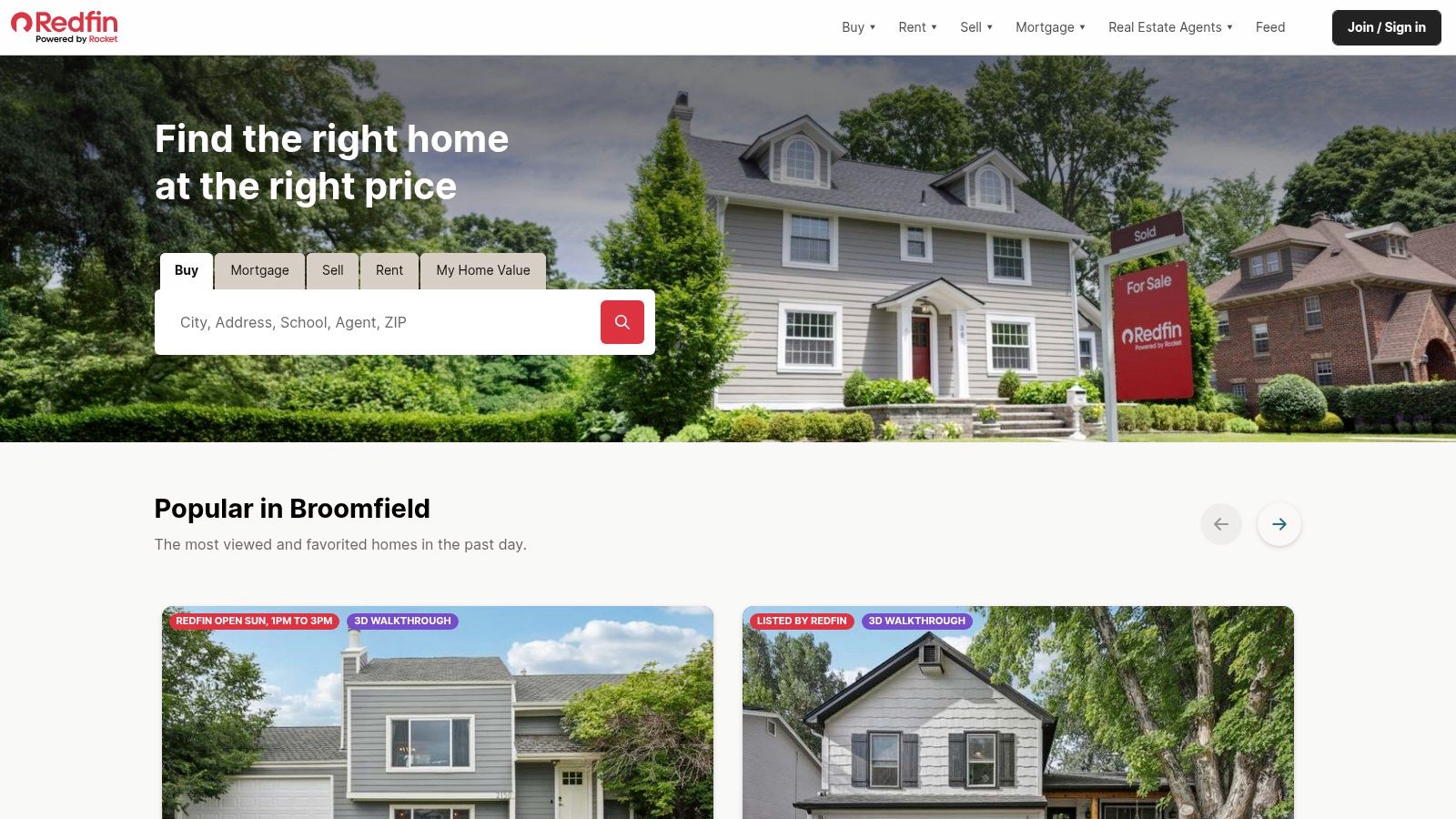
What truly differentiates Redfin is its financial model and agent integration. The platform provides detailed listing pages with robust data on price history, school ratings, and hyper-local market statistics. For sellers, Redfin offers a potential listing fee as low as 1% when they also buy their next home with the company—a serious game-changer compared to the standard 2.5-3%. Buyers can book home tours directly through the app, often with a Redfin agent, creating a seamless and efficient house-hunting process.
Pros & Cons
Pros:
- Potential for significant commission savings for sellers who also buy with Redfin.
- Seamless online-to-agent experience with integrated tour scheduling tools.
- Accurate and fast-updating MLS data, often refreshing every few minutes.
Cons:
- In-house agent coverage is not available nationwide, limiting access in some rural areas.
- The buyer refund and seller fee structures can vary significantly by market.
Website: https://www.redfin.com
4. Homes.com
Backed by the formidable real estate data powerhouse CoStar, Homes.com has stormed back into the market as a major player, positioning itself as an agent-friendly alternative to the established giants. Its core philosophy revolves around a “your listing, your lead” model, which means when you inquire about a property, you’re connected directly to the listing agent rather than an agent who paid for your contact information. This direct-line approach is a breath of fresh air for serious buyers who want to cut to the chase.
What makes Homes.com a compelling addition to the list of best real estate listing websites is its rapid growth and deep data integration from the CoStar network. This translates to a quickly expanding inventory and a user experience focused on providing neighborhood context, including school ratings and local market trends, all presented factually. For house hunters wanting to bypass the middleman and speak directly with the agent who knows the property best, Homes.com offers a refreshing and efficient pathway.
Pros & Cons
Pros:
- Connects buyers directly with the listing agent, reducing friction and response times.
- Heavy investment from CoStar is fueling rapid data and product expansion.
- Serves as an excellent complement to other portals for cross-checking listings and availability.
Cons:
- Coverage and feature sets are still evolving and may be less comprehensive in some markets.
- The user interface differs from major competitors, which may require a slight learning curve.
Website: https://www.homes.com
5. Trulia
While part of the Zillow family, Trulia carves out its own niche by answering a crucial question beyond the property line: “What’s it really like to live here?” It’s one of the best real estate listing websites for buyers who prioritize community and lifestyle over just square footage. Instead of just hammering you with property specs, Trulia dives deep into the neighborhood context, providing a more holistic, 360-degree view of a potential new home.
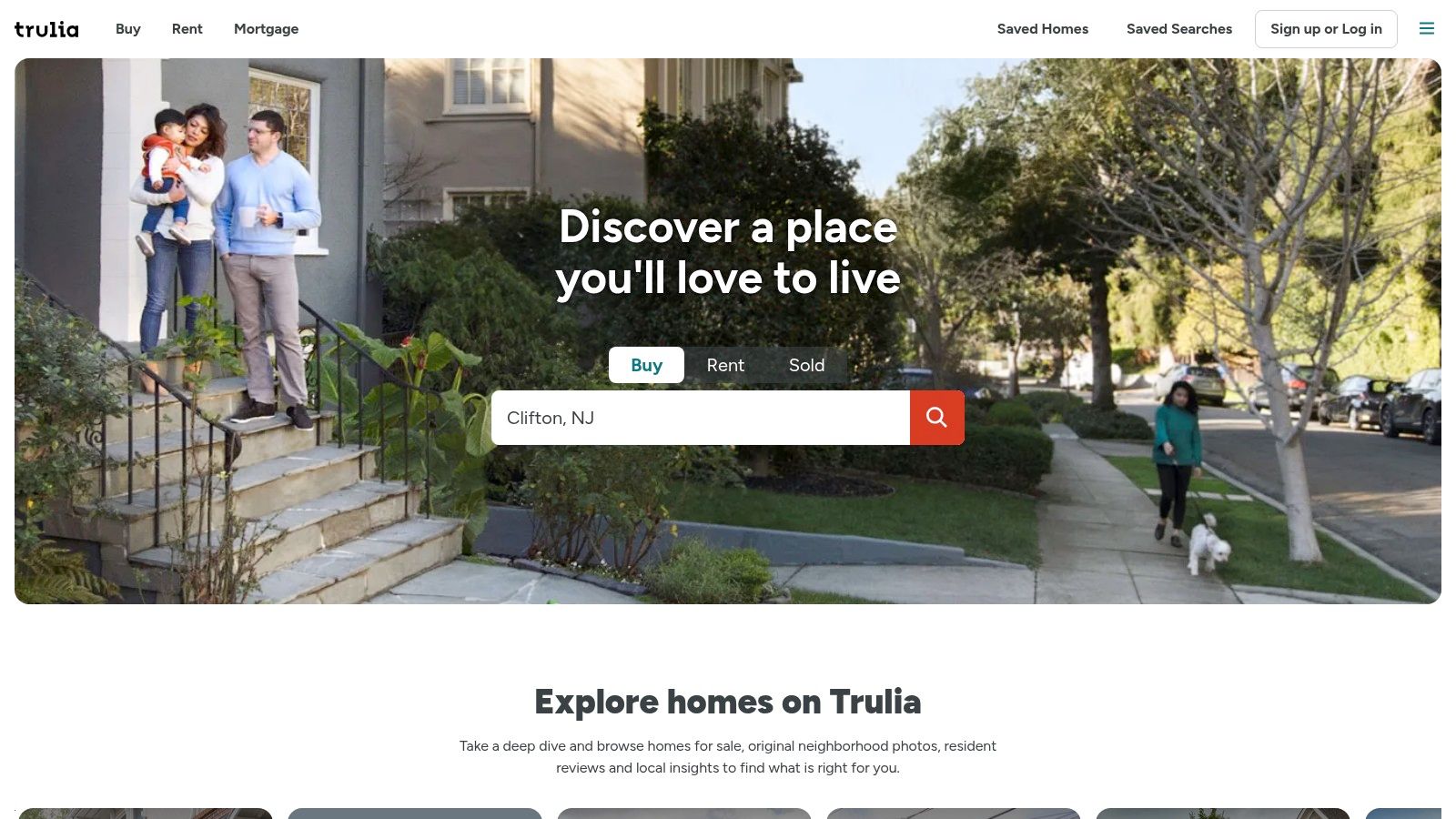
Trulia’s standout features are its rich, community-sourced data overlays. The “What Locals Say” feature offers unfiltered resident reviews and poll results on topics like walkability and neighborhood safety, giving you a ground-level perspective. Interactive map layers for schools, commute times, and amenities allow you to visualize daily life with unparalleled detail. This makes it an invaluable tool for anyone relocating to an unfamiliar area or trying to decide between different neighborhoods based on objective, quality-controlled data points.
Pros & Cons
Pros:
- Excellent tool for gauging neighborhood vibe and lifestyle through resident reviews.
- Invaluable for out-of-area buyers needing to quickly get oriented with a new city.
- Integrated with the Zillow Rentals network, providing broad exposure for landlords.
Cons:
- Inventory largely mirrors other Zillow-owned portals without offering unique listings.
- Relies more on community feedback for safety insights since the removal of specific crime maps.
Website: https://www.trulia.com
6. Apartments.com
When it comes to the rental market, Apartments.com is the definitive category leader. Specializing in professionally managed multifamily properties, it has become the go-to resource for renters seeking apartments, condos, and townhouses. The platform’s strength lies in its verified listings and rich media, which provide a level of detail that builds confidence in prospective tenants, easily making it one of the best real estate listing websites for the rental sector.
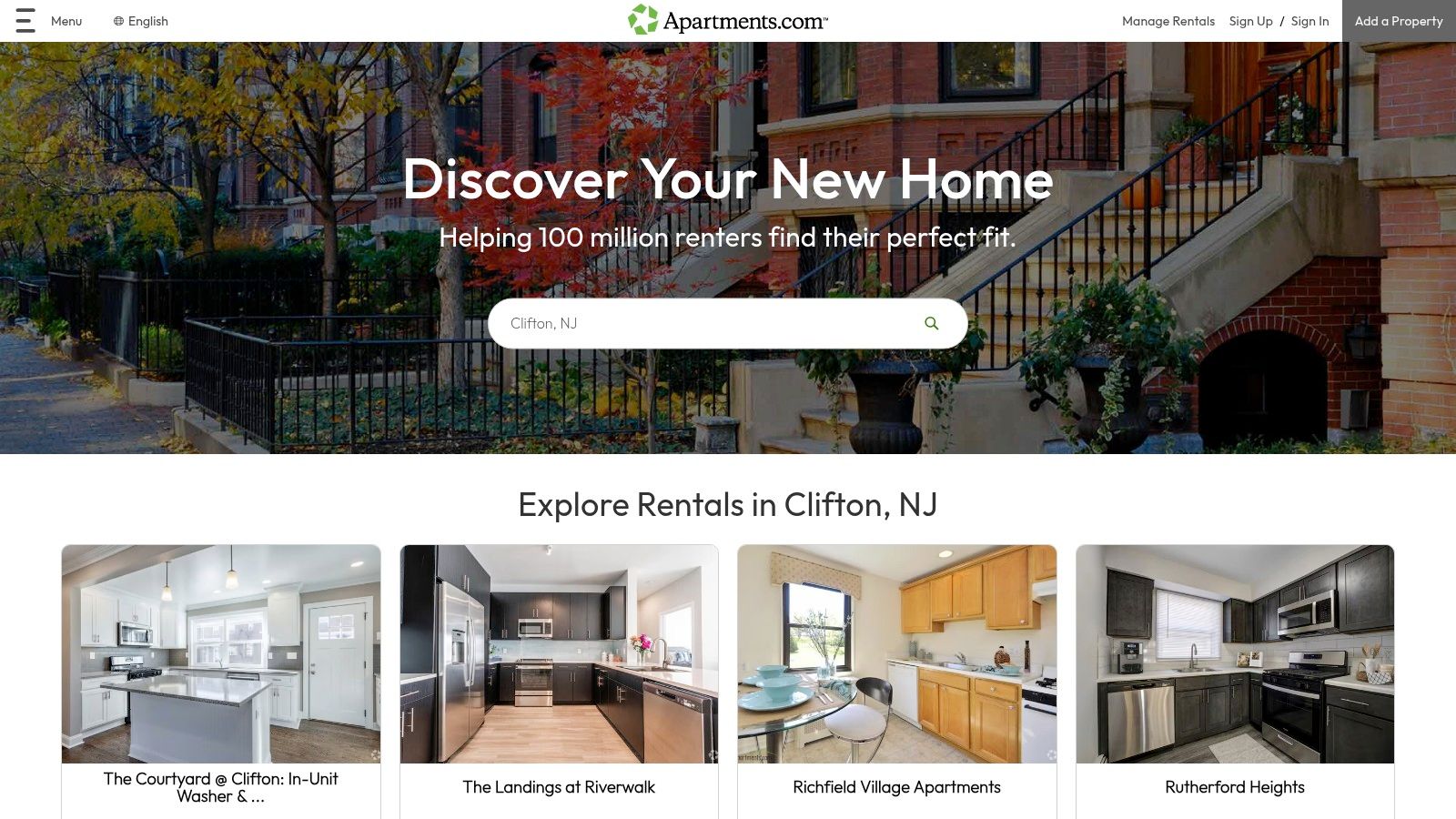
What makes Apartments.com stand out is its commitment to transparency. Many listings feature 3D Matterport virtual tours and detailed unit-level information, allowing users to see photos, videos, deposit amounts, and specific availability for individual units, not just the building. This granular detail helps renters make informed decisions. For those new to renting, understanding the process is key; you might find this rental property inspection checklist helpful before your first walkthrough. This focus on the property itself ensures an equitable and fair search process for all prospective tenants.
Pros & Cons
Pros:
- Deep inventory of professionally managed rentals with verified, high-quality content.
- Rich media features like 3D tours enhance the user’s search experience.
- Powerful search filters and unit-specific details streamline the rental process.
Cons:
- Premium advertising tiers are necessary to access the best features like 3D and video.
- Less focused on single-family rentals, where individual landlords might prefer other platforms.
Website: https://www.apartments.com
7. HotPads
For renters navigating the concrete jungles of major cities, HotPads is a game-changer. As part of the Zillow Group, it focuses almost exclusively on the rental market, delivering a map-centric experience designed for urban dwellers. Its clean, intuitive interface makes it one of the best real estate listing websites for finding apartments and homes for rent with surgical precision, letting you filter by specific transit lines, neighborhoods, or even by drawing your own search boundaries on the map.
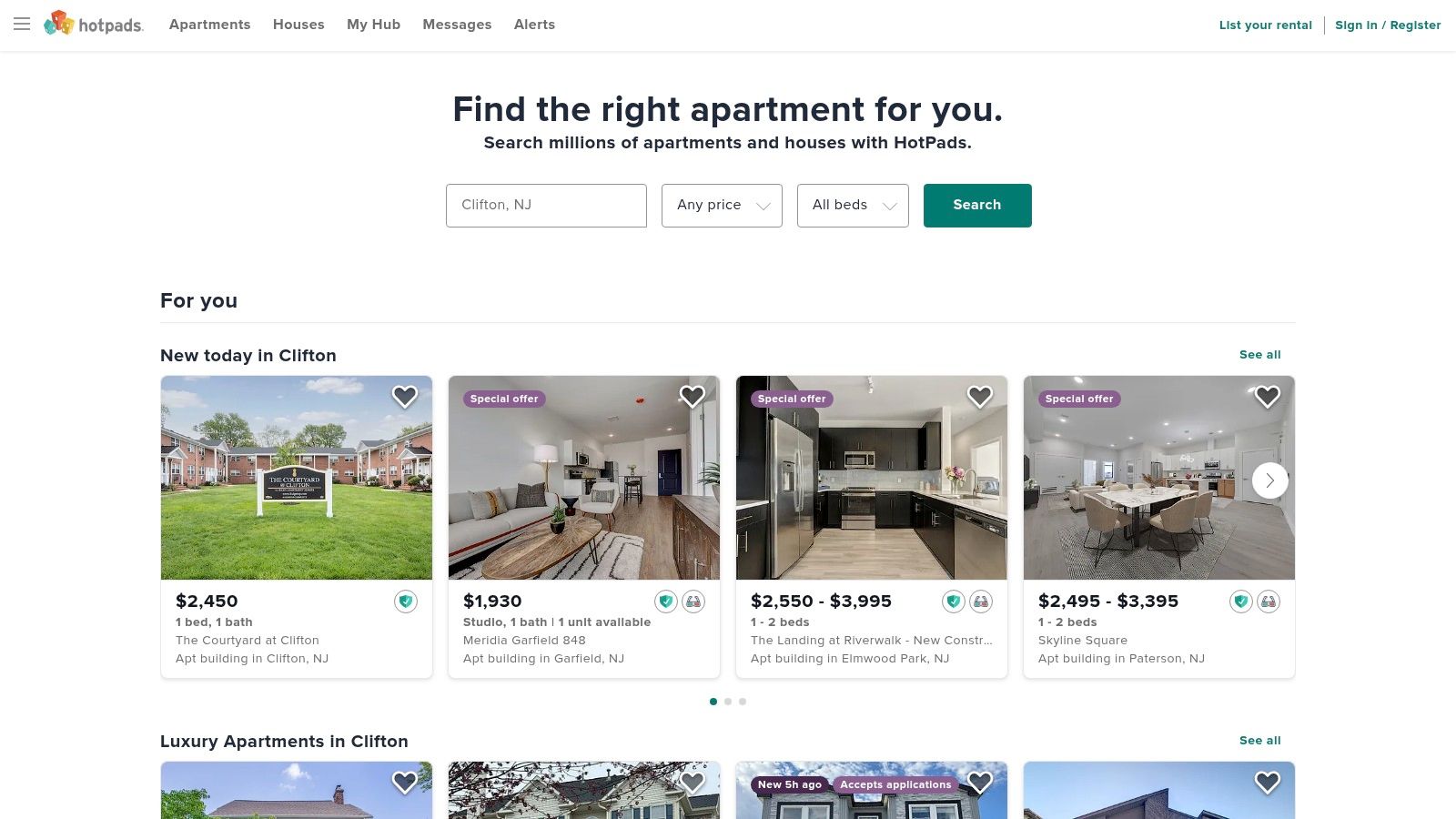
What makes HotPads stand out is its deep integration of lifestyle data directly into the search. Features like Walk Score, transit overlays, and school district boundaries are front and center, helping you understand the vibe of a neighborhood before you even visit. You can quickly see if a potential apartment is a five-minute walk to the subway or right next to your favorite coffee shop. Tapping into the massive Zillow Rentals Network inventory ensures you have a comprehensive, verified selection of listings at your fingertips.
Pros & Cons
Pros:
- Ideal for urban renters browsing by block or transit line.
- Connected to Zillow Group’s extensive rental database, offering vast inventory.
- Simple to save, compare, and track favorite listings with an easy-to-use interface.
Cons:
- Far less emphasis on for-sale properties, making it unsuitable for buyers.
- Feature development and updates can be slower relative to Zillow’s main site.
Website: https://hotpads.com
8. Estately
Estately carves out its niche by offering a clean, straightforward user experience focused on speed and direct access to MLS data. Instead of overwhelming you with proprietary tools and sponsored noise, the platform prioritizes a clutter-free interface and rapid listing updates, often refreshing its feed every 15 minutes. This makes it one of the best real estate listing websites for buyers who want the freshest inventory without the digital chaos.
The platform’s core mission is to connect serious buyers with a curated network of vetted local agents, making the transition from online browsing to in-person viewing seamless. For those exploring affordability options, Estately offers unique solutions like the Estately Land Lease program in select markets, designed to help reduce the upfront cost of homeownership. This focus on practical solutions and a clean search environment provides a refreshing alternative to the feature-heavy giants.
Pros & Cons
Pros:
- Minimal advertising clutter creates a focused, straightforward browsing experience.
- Fast MLS updates provide timely access to new listings and status changes.
- Highly rated mobile apps with reliable and prompt alert notifications for saved searches.
Cons:
- Smaller brand recognition and fewer unique features compared to larger competitors.
- Innovative programs like the land lease option are only available in limited geographic areas.
Website: https://www.estately.com
9. RealtyTrac
For investors and savvy homebuyers on the hunt for a diamond in the rough, RealtyTrac is a treasure map. This platform carves out a powerful niche by specializing in distressed properties, including foreclosures, pre-foreclosures, bank-owned homes, and auction listings. Its laser focus on this market segment makes it one of the best real estate listing websites for finding deals that simply don’t appear on mainstream portals.
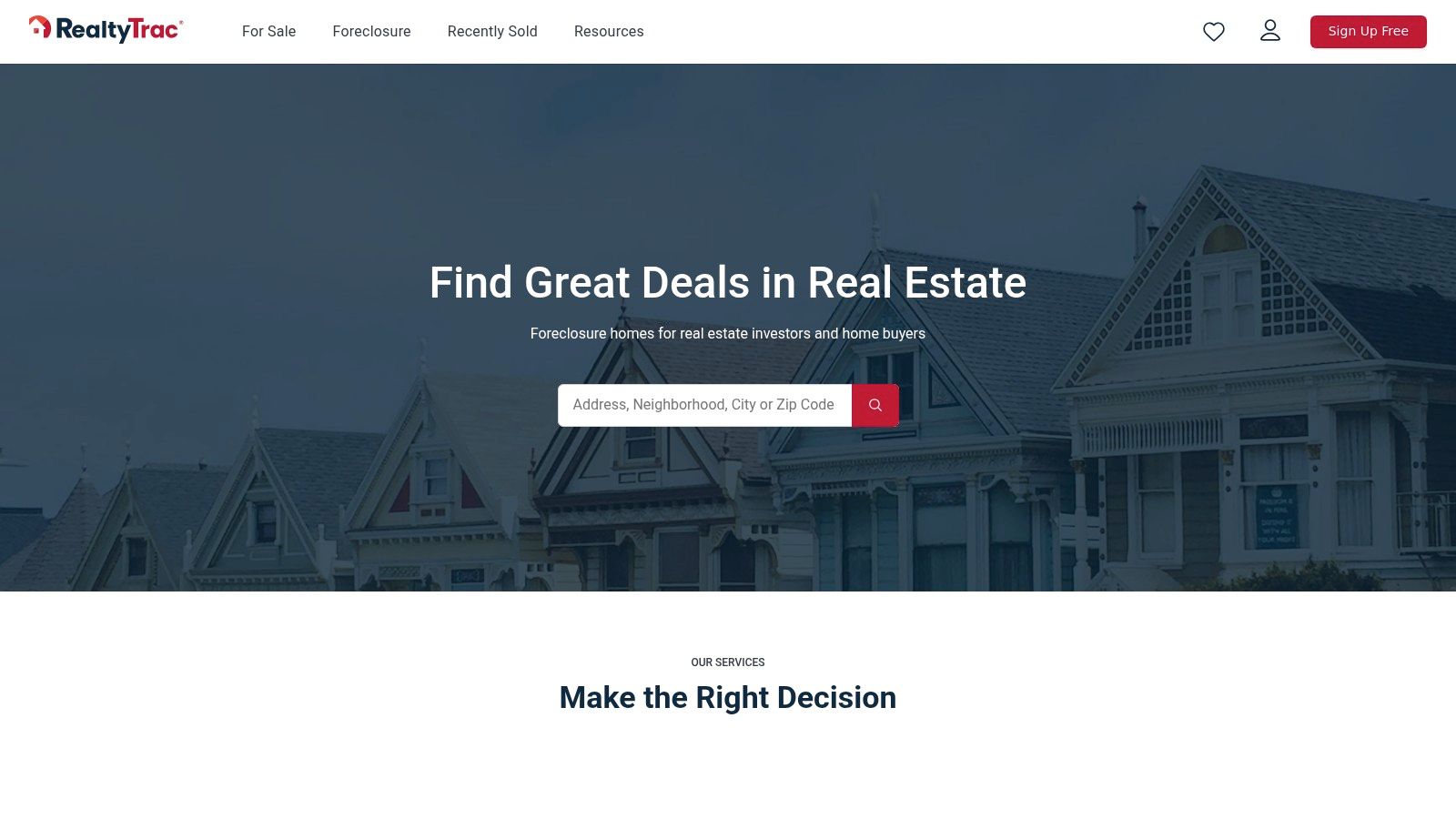
What sets RealtyTrac apart is the depth of its data and investor-centric tools. The platform offers comprehensive distressed property inventory with advanced filters that allow users to sift through opportunities with surgical precision. With national coverage and historical data stretching back to 1996, users can conduct serious due diligence. While full access requires a subscription after a trial period, the quality of information provided is geared toward making calculated, profitable investment decisions.
Pros & Cons
Pros:
- Deep niche coverage of distressed properties you won’t easily find on general portals.
- Offers a 30-day free trial to evaluate the database before committing to a subscription.
- Strong reputation and extensive historical data for thorough market research.
Cons:
- Full data access requires a paid subscription after the initial trial period.
- Pre-foreclosure data can sometimes lag; always verify information locally.
Website: https://www.realtytrac.com
10. Auction.com
Auction.com carves out a unique niche in the digital real estate space, operating as the largest online marketplace for distressed properties. This platform is the go-to destination for investors and experienced buyers seeking foreclosures, bank-owned homes (REO), and short-sale opportunities. It’s less about finding a turnkey dream home and more about discovering high-potential assets, making it one of the best real estate listing websites for serious bargain hunters who know their stuff.
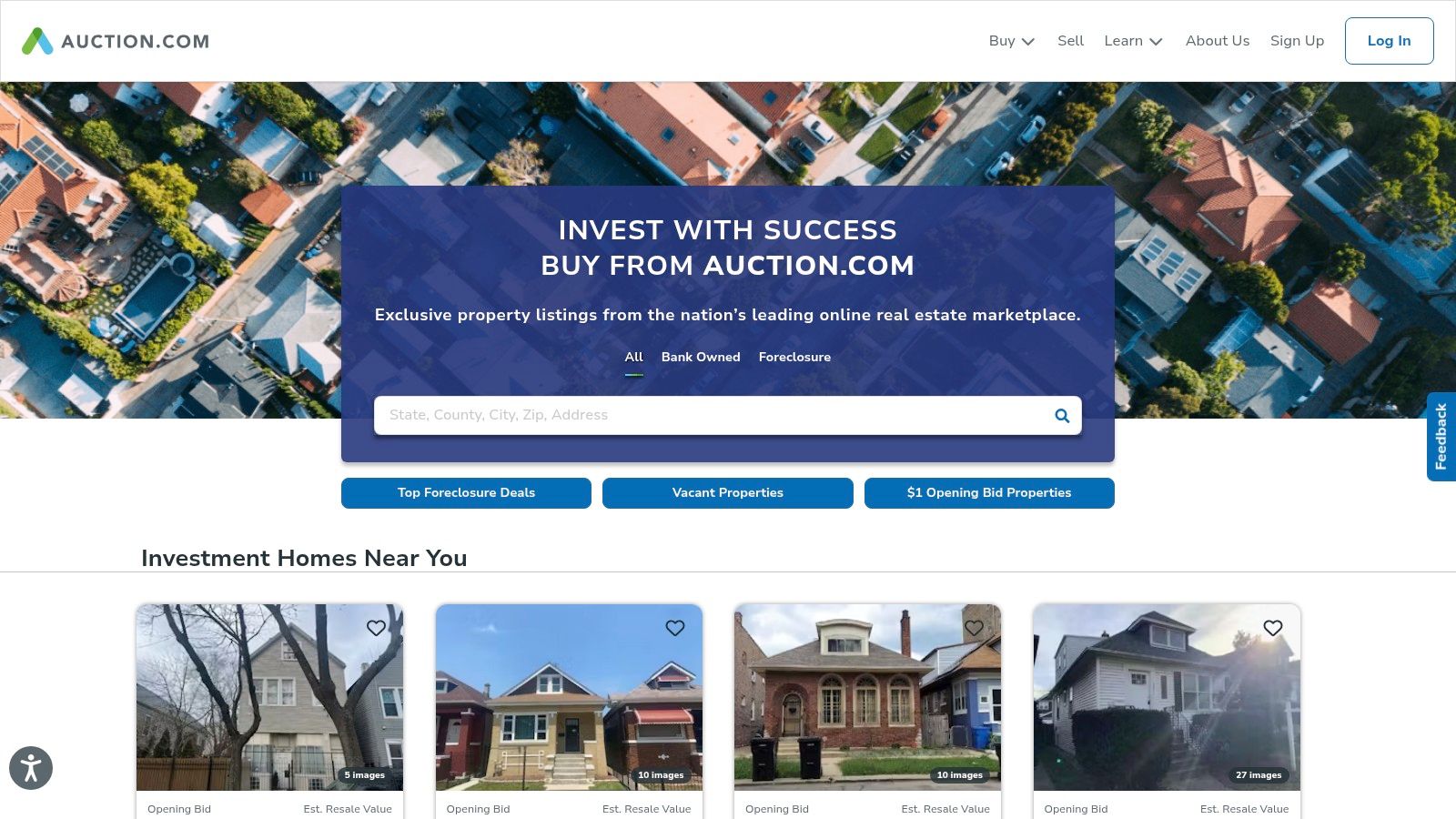
The platform’s strength lies in its transparent, structured bidding process. Users can access extensive state-by-state auction calendars, review due diligence documents, and participate in live online auctions from anywhere. A key feature is its Bidder Deposit System, which helps ensure that participants are serious, reducing non-performance and creating a more reliable auction environment. To succeed here, you must be prepared for the fast-paced nature and extensive research required, often using real estate market analysis tools to evaluate a property’s true potential.
Pros & Cons
Pros:
- Access to a massive inventory of distressed properties often unavailable on the MLS.
- The transparent auction process provides clear bidding histories and property documentation.
- Potential to acquire properties significantly below traditional market value.
Cons:
- Buyer’s premiums, typically 5% of the winning bid, are a significant added cost.
- Properties are sold “as-is,” with short timelines and earnest money requirements that demand cash readiness and experience.
Website: https://www.auction.com
11. LoopNet
For investors and businesses, LoopNet is the commercial real estate equivalent of Zillow. It’s the undisputed leader for buying, selling, and leasing properties like office buildings, retail spaces, industrial warehouses, and multifamily units. The platform’s immense scale, backed by the powerhouse data of CoStar Group, provides unparalleled reach into the commercial market, making it an essential destination for serious investors and brokers. Its targeted audience makes it one of the best real estate listing websites for commercial ventures.
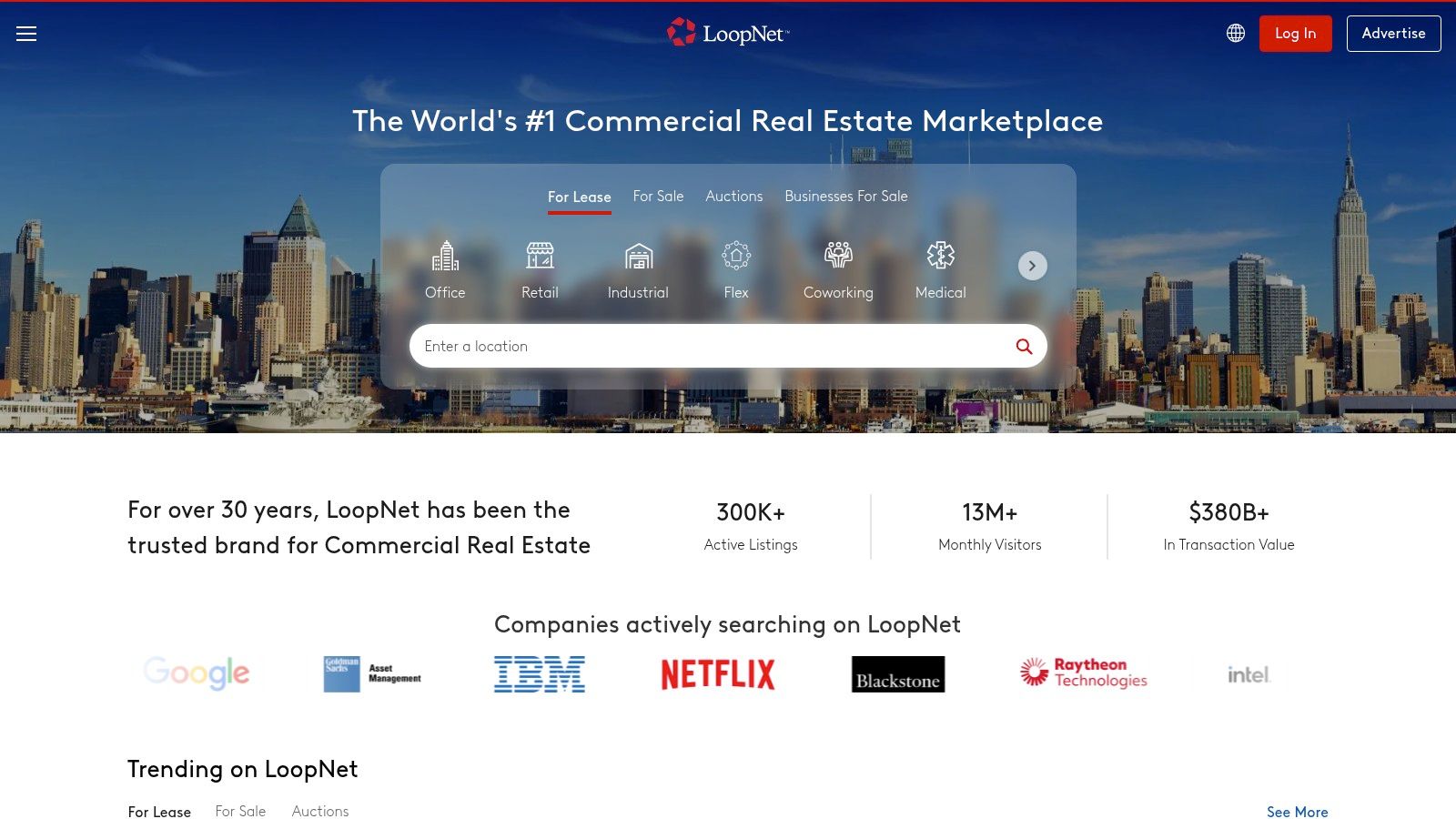
What makes LoopNet so powerful are its sophisticated marketing tools designed for a professional audience. Paid listing tiers offer access to media-rich presentations, including professional photography, 3D tours, and drone imagery to showcase properties effectively. Brokers can leverage powerful analytics to track listing performance and use the LoopLink integration to seamlessly display their listings on their own websites, creating a cohesive and professional online presence.
Pros & Cons
Pros:
- The broadest CRE visibility and most powerful lead-generation platform available.
- Advanced, targeted marketing and retargeting options to reach qualified investors.
- Valuable performance analytics for brokers and property owners to gauge interest.
Cons:
- Premium listing tiers can be a significant investment, especially for smaller owners.
- Pricing transparency can be inconsistent; it’s best to connect with a sales rep for exact costs.
Website: https://www.loopnet.com
12. LandWatch
For those dreaming of wide-open spaces, LandWatch is the go-to digital frontier. This specialized marketplace ditches the suburban cul-de-sacs to focus exclusively on land, ranches, farms, and rural properties. As part of the Land.com network, its reach is extensive, making it one of the best real estate listing websites for anyone looking to buy or sell acreage, from a small homestead plot to a sprawling thousand-acre ranch.
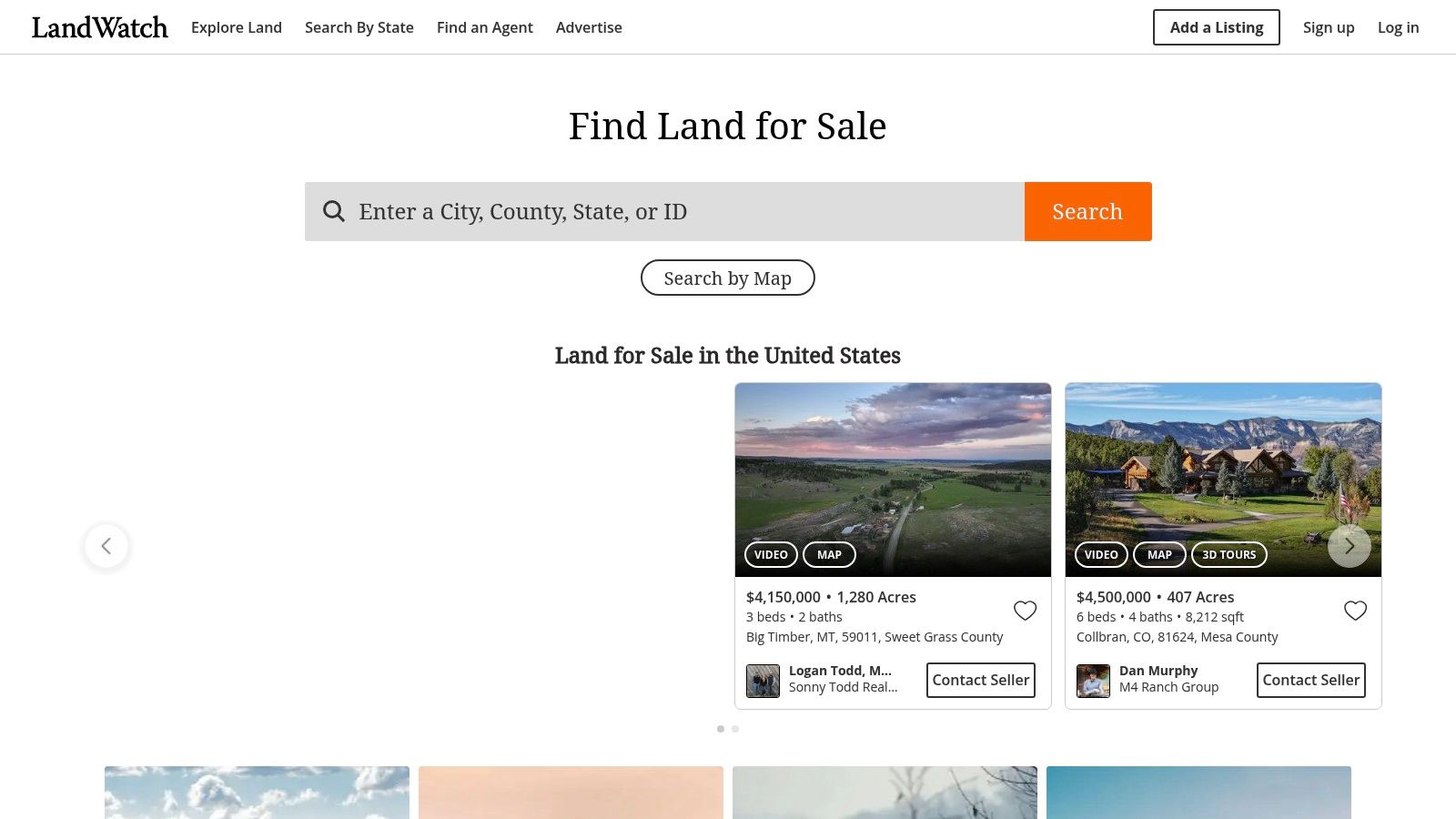
LandWatch goes beyond simple listings by providing tools tailored to its niche. For sellers and brokers, listings are syndicated across the entire Land.com network, maximizing exposure to a highly targeted audience. The platform offers powerful marketing features like listing analytics and custom mapping tools. Buyers benefit from access to comparable sales data, which is crucial for evaluating the unique value of rural land where traditional comps often fall short.
Pros & Cons
Pros:
- Deep specialization in rural land, farms, and large acreage with a national reach.
- Strong marketing tools and syndication for brokers and individual sellers.
- Helpful comparable sales data and mapping tools for acreage evaluation.
Cons:
- Not suitable for finding conventional single-family homes in suburban areas.
- Listing plans are quote-based, requiring contact with a sales representative for pricing.
Website: https://www.landwatch.com
Top 12 Real Estate Sites Feature Comparison
| Platform | Core Features ✨ | User Experience ★★★★ | Value Proposition 💰 | Target Audience 👥 | Unique Selling Points 🏆 | Price Points 💰 |
|---|---|---|---|---|---|---|
| Zillow | 3D exterior views, Offer Insights, Tour Itineraries | Massive inventory, strong filters, mobile | Broad market coverage, deep rentals network | Buyers, renters, general users | SkyTour 3D, BuyAbility guidance | Free access; Zestimate not official 💰 |
| Realtor.com | MLS listings, agent/seller tools, saved alerts | Accurate MLS data, updated market trends | High data accuracy and MLS timeliness | Buyers seeking accurate listings | Extensive MLS coverage | Free to use 💰 |
| Redfin | In-house agents, commission transparency | Seamless app, agent integration | Potential savings on commissions | Buyers & sellers wanting agent help | On-demand tours, savings calculator | Free; commission varies 💰 |
| Homes.com | Direct agent contact, CoStar network marketing | Growing inventory, evolving markets | Less friction contacting agents | Buyers looking agent connection | Strong agent and builder marketing | Free access 💰 |
| Trulia | Neighborhood insights, resident reviews | Useful for lifestyle info | Helps understand neighborhood vibe | Out-of-area buyers, lifestyle-focused | Local reviews, school & commute overlays | Free 💰 |
| Apartments.com | 3D virtual tours, detailed unit info | Rich media, strong search filters | Deep rentals with verified data | Renters seeking multifamily homes | Professional rental listings, Matterport tours | Basic free; premium tiers for 3D✨ |
| HotPads | Map-based search, transit overlays | Mobile-friendly, easy contact | Urban rental focus | Urban renters, transit users | Transit/school map overlays | Free 💰 |
| Estately | Fast MLS updates, agent matching | Clean UI, timely alerts | Minimal ads, good MLS cross-checking | Buyers wanting vetted agents | Affordability tools, less clutter | Free 💰 |
| RealtyTrac | Distressed properties, investment tools | Niche investor tools | Foreclosure focus | Investors, distressed property buyers | Deep foreclosure data, 30-day free trial | Subscription after trial 💰 |
| Auction.com | Online bidding, auction calendars | Transparent auction process | Foreclosure auction marketplace | Experienced buyers, investors | Extensive auction docs, online bidding | Buyer premiums apply 💰 |
| LoopNet | Commercial listings, paid media tiers | Powerful marketing & analytics | CRE lead generation | Commercial brokers, investors | Largest CRE platform, retargeting options | Premium tiers expensive 💰 |
| LandWatch | Land/ranch listings, custom mapping | Specialized tools, comps for acreage | Rural land specialization | Land buyers, ranchers, farmers | Syndication across 3 Land.com sites | Quote-based listing plans 💰 |
From Clicks to Keys: Making Your Next Move with Confidence
Navigating the digital labyrinth of real estate can feel like a full-time job. But you’ve just walked through a comprehensive breakdown of the industry’s heavy hitters, from the data-rich environments of Zillow and Realtor.com to the niche-specific powerhouses like LoopNet for commercial ventures and LandWatch for your rustic escape. We’ve peeled back the curtain on each platform, exposing not just the flashy features but the core functionalities that truly matter to buyers, sellers, and investors.
The central takeaway is clear: there is no single “best” real estate listing website for everyone. The ideal platform is a direct reflection of your unique goals. A first-time homebuyer in Los Angeles might find Redfin’s agent-centric model and user-friendly map search invaluable, while a seasoned investor looking for distressed properties will find a strategic goldmine in RealtyTrac or Auction.com. Your mission dictates the tool.
Synthesizing Your Strategy
As you move forward, the key is to transform this information into a killer search strategy. Don’t limit yourself to a single platform. Instead, build a customized toolkit based on your needs:
- For the Traditional Homebuyer or Seller: Start with a broad-net approach. Use Zillow or Realtor.com for their massive inventory and comprehensive data. Cross-reference your findings on a platform like Redfin to get a different perspective on market value and agent insights. This is your actionable first step.
- For the Niche Investor: Your strategy demands specialization. If you’re flipping houses, your primary hubs should be RealtyTrac and Auction.com. Commercial investors should live on LoopNet, while those dreaming of open spaces will find their focus on LandWatch.
- For the Renter: Your search is about lifestyle and logistics. Apartments.com and HotPads are designed specifically for you, with filters that prioritize amenities, commute times, and neighborhood vibes over property appreciation or school districts.
Beyond the Browser: The Human Element
Remember, these powerful websites are your launchpad, not your final destination. They provide the data, the listings, and the initial connection, but they can’t replicate the nuanced, hyper-local expertise of a professional on the ground. The most successful real estate journeys happen when cutting-edge technology is paired with seasoned human intelligence. An algorithm can tell you a property’s price history, but it can’t tell you about the unlisted neighborhood park revitalization project or the subtle shift in market sentiment on a specific block.
Ultimately, using the best real estate listing websites effectively is about leveraging them to ask smarter questions and identify stronger opportunities. Arm yourself with the data, refine your search, and then partner with an expert who can translate those digital breadcrumbs into a tangible, successful transaction. Your dream property is out there, and with the right combination of digital tools and professional guidance, you are now fully equipped to find it.
You’re now armed with the intel to conquer the digital real estate landscape, but turning those saved searches into a signed contract requires local expertise. At ACME Real Estate, we live and breathe the Los Angeles market, translating digital data into real-world wins for our clients. Ready to make your LA dream a reality? Visit ACME Real Estate to connect with a local expert today.
